Margot Robbie in I, Tonya: ‘Bad girls have more fight’
Margot Robbie’s Oscar nomination for playing disgraced ice skater Tonya Harding is one for the bad girls.
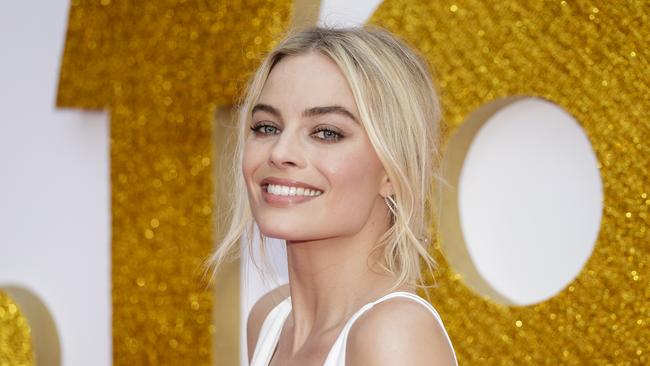
‘I thought being famous was going to be fun. I was loved for a minute. Then I was hated. Then I was just a punchline.’’ The words are attributed to disgraced American ice skater Tonya Harding, but they are spoken by Australian actress Margot Robbie. It’s an early scene in I, Tonya, the rule-bending movie that this week put 27-year-old Robbie in the running for an Academy Award.
The difference between subject and speaker is important, on screen and off. Robbie, who grew up on a farm in Dalby, Queensland, one of four kids raised by a single mother, is more famous than she can believe right now. “It’s something I never dreamt would happen to me,’’ she tells Review during a visit to Sydney for the launch of the film. “It is surreal. It is insane.’’
Only six Australians have been nominated for a best actress Oscar: May Robson was first in 1933 (she lost to Katharine Hepburn), then Judy Davis, Cate Blanchett, Nicole Kidman, Australian-New Zealander Keisha Castle-Hughes, aged 13, for Whale Rider, and Naomi Watts. Only two of them have won: Kidman on her second nomination, for The Hours, and Blanchett on her third, for Blue Jasmine.
Now Robbie is the seventh. “Honestly, I am kind of stunned still,’’ she says. “I haven’t wrapped my head around it just yet. I don’t know what to think. I am just so happy.”
She is proud to follow in the footsteps of local stars such as Kidman and Blanchett and honoured to stand alongside the other nominees this year: Meryl Streep and Frances McDormand, both previous winners, Sally Hawkins, and Saoirse Ronan, who is a good friend. McDormand is favourite to win, for Three Billboards Outside Ebbing, Missouri.
“To be amongst this company ... these actresses are people I admire so much. They make me want to be a better actor just by watching their films, let alone having my name uttered in the same breath as them.’’
■ ■ ■
Tonya Harding, an Olympian, was world-famous, for a while.
Then, in the mid-90s, infamous: fined, put on probation and banned for life from competitive figure skating after being implicated in an attack, organised by her husband, on rival Nancy Kerrigan.
When I start to quote that line about being loved for a minute, then being hated, Robbie leans forward and finishes it: “Just a punchline.”
“I love that line,’’ she says.
No one is suggesting Robbie is about to become a punchline but she knows that magazine cover shoots and award ceremonies are an occasional, and perhaps short-lived, part of stardom. I ask if she has yet got her head around how famous she is. “No!” She pauses for a bit. “I think the best way to cope with it ... well, maybe it’s not the best way, but it’s wonderful to be able to keep working, because when you are on set you are so removed from this.
“This time of year everyone sees pictures of the red carpet and I think sometimes it seems that’s what this job is, but it’s not. It’s a lovely moment that happens a few times a year but for the majority of your life you are on a film set, you are with your crew, you are with this family that you grow to love.
“It’s very removed from the idea of fame, and that’s why it’s probably my favourite place to be. No one feels famous on a film set. You’re all there to work and you have this unified purpose that brings everyone together. Sets are not glamorous places.’’ Here Robbie laughs a while.
“People think they are luxurious but they are glorified construction sites. You are using a Portaloo day in, day out. There’s nothing fancy about it, and that’s what makes a win so much sweeter, that sense of being in the trenches with everyone. At those special days of the year you wish you could have your entire crew up there with you.’’
I, Tonya is directed by an Australian, Craig Gillespie, and produced by the film production company Robbie set up in 2014, LuckyChap Entertainment. However, the movie was not nominated for best picture or best director. It’s an innovative production, one with lots of breaching of the so-called fourth wall that separates actors from the audience. The final scene, where Robbie speaks directly to us, is brilliant, for the way it’s done and for what she says.
■ ■ ■
Robbie may have played Harding on screen, but she is not Harding. Nor is she trying to replicate Harding. The skater herself has pointed out a few areas where she thinks artistic licence has been taken. Robbie-Harding swears much more than Harding did, for starters. The accused laughs. “Yeah, yeah. That’s my fault. I swear so much when I act. I get caught up in the moment. It’s a terrible habit. I did apologise to her about the swearing.’’
For the record, Robbie does not swear once when we chat in her suite at Sydney’s Park Hyatt on Circular Quay. And when it comes to swearing in the film, Harding’s mother, played by Allison Janney, who is up for a supporting actress Oscar, makes her look like Cinderella.
Robbie did meet Harding just before filming started, and her reasons for doing so are interesting. It was not about helping her decide how to be Harding on screen.
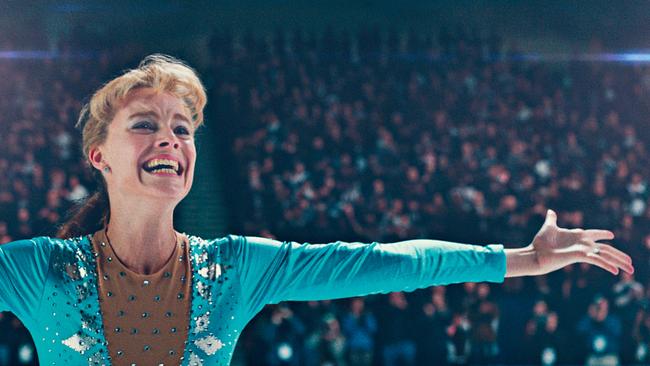
“It didn’t alter the way I was going to play the character,’’ she says. “I plotted out the character for about six months before I met her. I put it off to the last minute because I wanted to concentrate on her as a character, as opposed to a person, because this is not a documentary and it’s not a traditional biopic. It is a film and it is an unconventional film and I didn’t want to be beholden to any particular portrayal.
“I wanted to show everything and let the character react in the moment ... and just have human interactions. That’s all you can do to find the truth in a situation: react in a truthful way, react how humans react.
“Tonya, like everyone, is full of conflicting emotions. She says she doesn’t care what people think but you can feel the hurt in her voice when people say they don’t like her. There’s a lot of humanity in her and I think for so long she was dehumanised, demoted to one headline, one punchline, a caricature. I just wanted her to exist as a person and to do that I needed to treat the character on its own, decide how I was going to play the character, and then meet her. And when I did meet her it was really just out of respect, as opposed to research.’’
Despite that character-first approach, when they did meet the actress was moved. “The thing that struck me, the thing that broke my heart,’’ she says, “was that she didn’t seem past it, even though it was 25 years later. It wasn’t a past chapter of her life that she had moved on from.” Will the movie change that? Robbie, who has since met Harding at premiere screenings, hopes so. “Seeing her since the film came out, she seems more peaceful. She has said she now has closure. That is not why we set out to make the film, it was not why I set out to play that character, but the fact that it came along with this journey is a pretty great feeling.’’
■ ■ ■
As a schoolgirl, Robbie studied drama at Somerset College, an independent Christian school in Mudgeeraba, Queensland. Established in 1983, its alumni include bestselling author Kate Morton and Olympic gold medal-winning cyclist Sara Carrigan.
On graduation Robbie gained entry to an even more prestigious institution: Neighbours. Indeed, if she wins an Oscar on March 4, she will not be the first Neighbour to do so. Russell Crowe, who played a petty crook in five episodes in 1987, has that honour. Robbie had a leading role in the soap opera from 2008 to 2011. She could have continued but decided it was time to go to Hollywood.
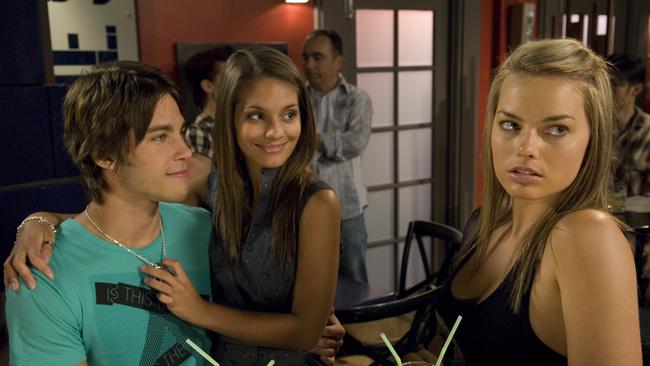
Even while playing Donna Freedman on Ramsay Street, she was doing intense work with a voice coach to develop the accent needed for American movies. It’s something you notice about her in all of her roles: she sounds right. This took an amusing twist during the making of the 2015 movie Focus, in which she plays a beautiful grifter who hooks up with an elite con-man, played by superstar Will Smith. She added some dialogue to the script so that, in a scene in Monaco, Smith would warn her to be careful because there were dastardly Australians about (Robert Taylor plays an Ocker racing-car driver whose every second word starts with an F).
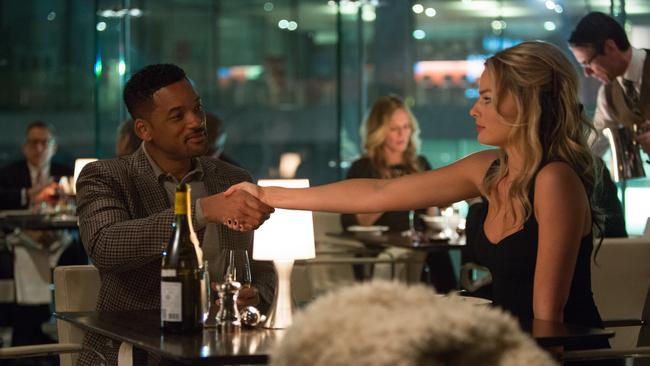
Smith didn’t think the in-joke would work because no one watching the film would know Robbie was Australian. Robbie said her friends back home would, and it stayed in the script. This goes to Robbie’s love of home. She now lives in Los Angeles, with her English filmmaker husband Tom Ackerley, whom she met on the set of the 2015 movie Suite Francaise. They married in December 2016, in Byron Bay.
I note that this interview will run at the Australia Day weekend. I ask what she most loves about being Australian. Robbie smiles. “That’s a big question! I am so proud to be Australian, in my industry and the world at large. Aussies just have a wonderful reputation. I have done a lot of travelling … particularly when I was younger, and it’s so nice to wear that badge of honour. You speak in an Aussie accent and you know people are going to respond in a positive way. It’s such a great feeling to be proud of your country and the people in it and, I guess, the persona that everyone seems to emulate around the world in whatever walks of life they lead.’’
■ ■ ■
Focus was Robbie’s second hit in Hollywood. The one that made her name was Martin Scorsese’s The Wolf of Wall Street (2014), in which she also played a real person, the clever, striving, ruthless second wife of corrupt Wall Street broker Jordan Belfort (Leonardo DiCaprio).
It was followed by Focus, then, in 2016, Suicide Squad, in which she is the sociopathic former psychiatrist Harley Quinn, lover of Joker (Jared Leto), and The Legend of Tarzan, in which she is a no-nonsense Jane to Alexander Skarsgard’s torso-rippling Tarzan.
Those three characters and the Harding one have something in common. I may define it too simply when I mention it to Robbie, but she knows what I’m talking about. Why does she like playing bad girls? She talks about how it’s easier to act “when you know your character’s point of view’’.
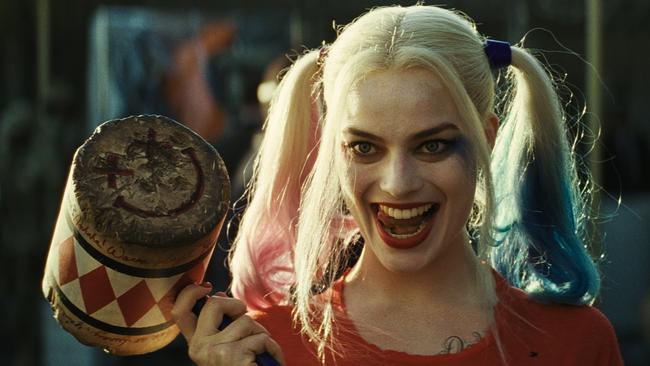
“I feel the more defiant a character is, the easier it is to understand what they’re fighting for and to feel motivated by that, feel empowered by that. I also like to play characters who are a little lost and conflicted and confused, characters who go on a journey and find some resolution, or at least learn something.’’
But you could do that playing Florence Nightingale. Robbie laughs. “Yes, OK, if you are talking about the bad girls, I guess it excites me to fight for something.’’
The bad girls have something else in common: they are beautiful. It feels a bit awkward to mention this, but I do. Robbie says: “Well, I don’t see it that way actually.’’ She laughs lightly and adds: “But go on, go on.” So I ask her how her beauty influences her work as an actor. I would ask the same question of Skarsgard if I were sitting in a hotel suite with him.
Robbie pauses and fiddles with her gold neck chain. She takes a sip of tea.
“I don’t see myself like that. It’s obviously lovely to have a team of professionals doll you up for an event ... but on set it’s about removing yourself from the character. It’s not about being beautiful or not beautiful. It’s about being someone else, about taking a walk in their shoes, and to do that you need to lose your own aesthetic sometimes.
“It helps to do an accent, so I don’t sound like myself. It helps to wear costumes, so I don’t dress like myself, and to have someone do my hair and make-up in a way that I’d never do it.
“I love that because I stop feeling myself and I stop looking like myself and sounding like myself. It’s honestly why I love acting. You get to be someone else, and I don’t think it’s ever about being someone beautiful or not beautiful. It’s just about being another human being.’’


To join the conversation, please log in. Don't have an account? Register
Join the conversation, you are commenting as Logout